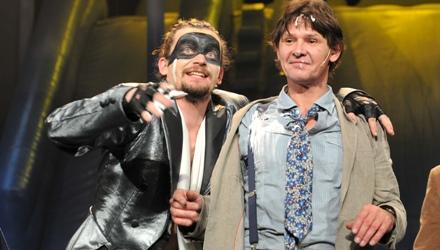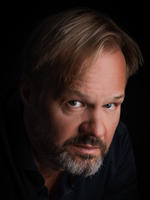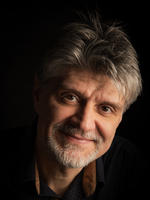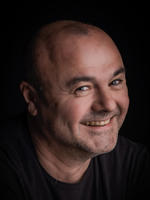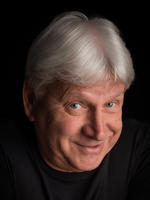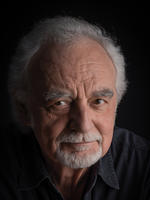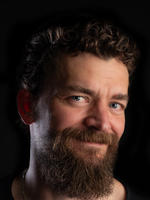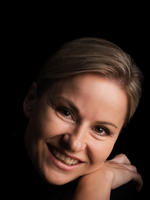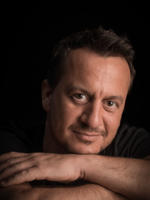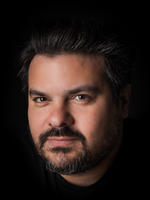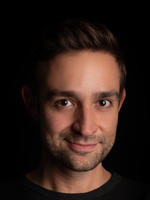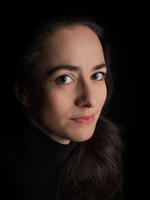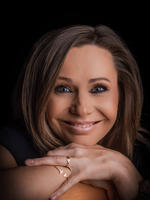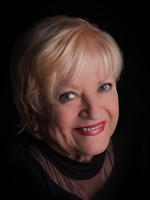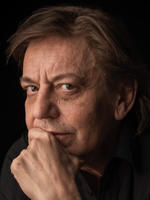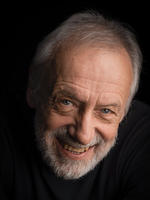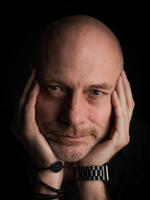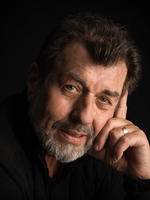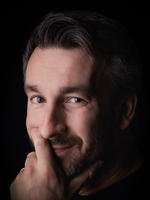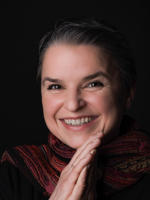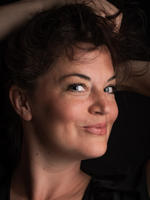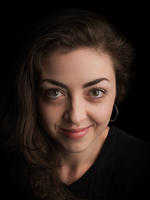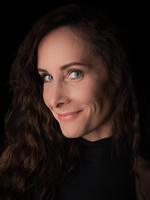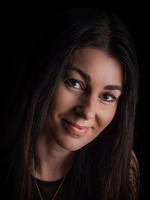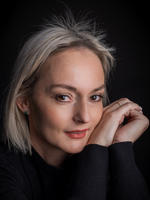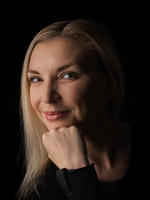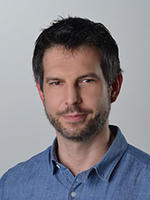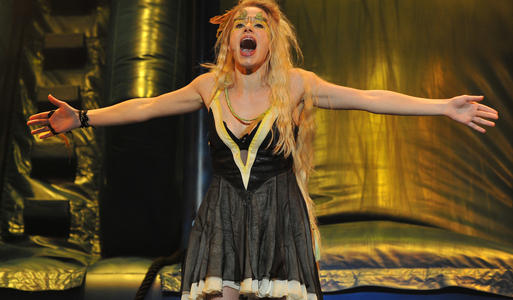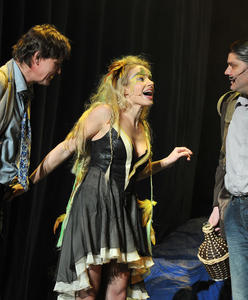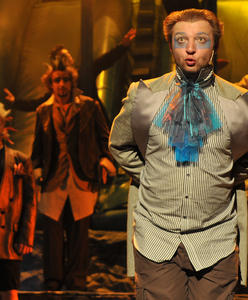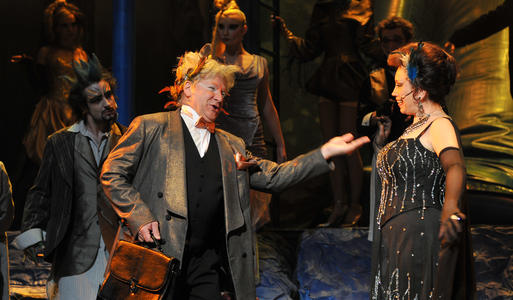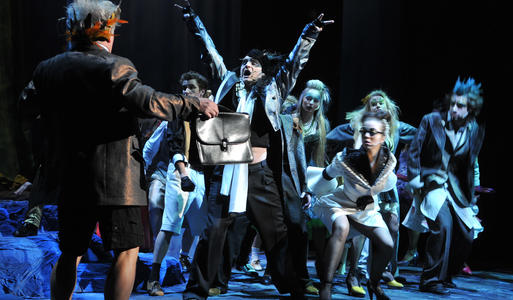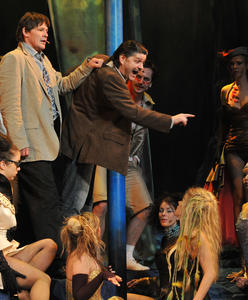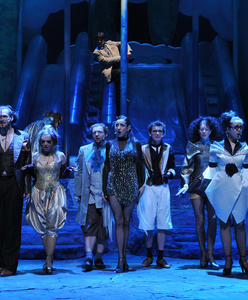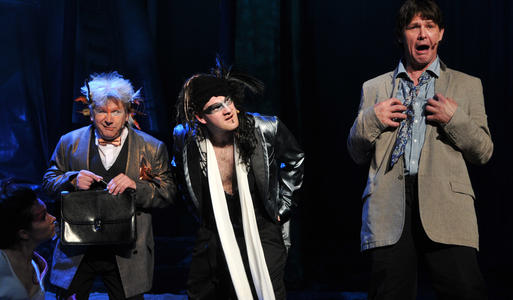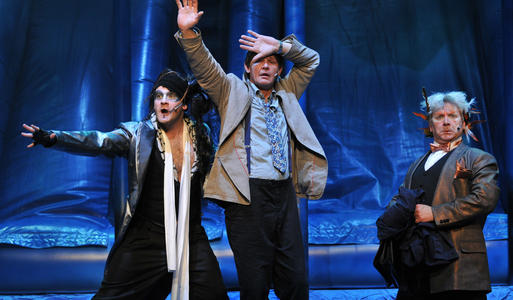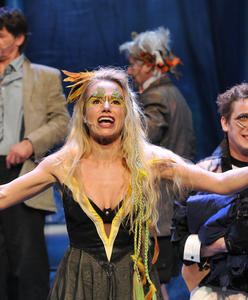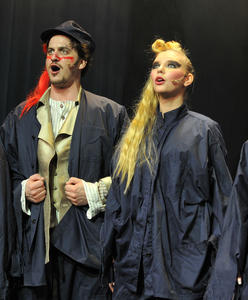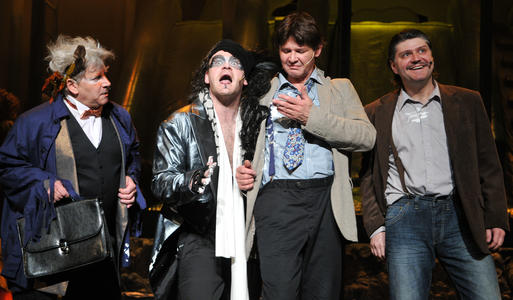Musical-style political satire
Vít Závodský 14. September 2010 zdroj Týdeník Rozhlas
For the last six years, Brno City Theatre has been offering a rich repertoire of high quality productions at its Music Theatre. These works, which are popular with the public and praised by experts, include world-famous musicals, classical operettas and particularly new pieces from their own authorial workshops. This range of works has now been joined by current production The Birds (according to Aristophanes), prepared from the original by poet Jiří Žáček and composer Zdenek Merta.
As in his more well-known plays (Peace, Lysistrata) the ancient comic playwright aimed The Birds at the local conditions present in his home town of Athens, and so today some alterations need to be made. Director of the production and of Brno City Theatre Stanislav Moša prepared this text for performance while at JAMU (the Janáček Academy of Music and Performing Arts) in 1982 and Žáček’s sensitive and comically versed adaptation was performed just before the 1989 Velvet Revolution at the National Theatre in Prague. This year’s production showed that this mildly updated version has kept its comprehensibility and the topicality of its ideas, as well as remaining entertaining and attractive to spectators. In this production, which successfully combines several genres, the authors stuck to the original plot by Aristophanes, which is a tale of two friends, sharply pragmatic Primabrachos (Pisthetaerus - Martin Havelka) and the more passive Doufalion (Euelpides - Tomáš Sagher), who demagogically direct the birds to build a city in the air, Cloudcuckooland, gradually take over their free kingdom and eventually even manipulate the Olympians. The more compact first half is mainly a metaphorical, fairytale spectacle in which the vertically oriented, neck-straining set by Christopher Weyers is filled with strikingly made-up birds that really fly, sporting inventive costumes by Andrea Kučerová. Choreography is by Aneta Majerová and Dan Kalousek’s live orchestra provides the music.
The more fragmented second part deals with the infiltration of the self-serving humans and also gods into the birds’ collapsing society and is aimed more closely at the situation in today’s Czech Republic: a satirical reflection of our political scene is created in a cabaret style, though without pandering to the audience through caricature, and more via hints and allusions. The numerous alternated cast (let’s mention Zdena Herfortová’s eruptive Hen and Erik Pardus’s polyglot Laureate) earn their applause up on the open stage. This fairly short production is both entertaining and chilling.
The Birds still have a lot to say even after twenty years
Luboš Mareček 5. May 2010 zdroj MF Dnes
Brno City Theatre have taken the plunge with a ‘new old’ musical political satire, ‘The Birds according to Aristophanes’. The author and poet Jiří Žáček, music composer Zdenek Merta and director Stanislav Moša have returned to the work, which was first put on at Prague National Theatre, after twenty years. This piece, which featured a caricatured bird International, stirred the waters at the socialist theatre a few months before the revolution. After November, when the regime was defeated, Žáček´s Birds was withdrawn from the repertoire. The magic paradox behind the silencing of this production: after the change in the political system, the theatre was afraid that the title might be understood as a parody of the Velvet Revolution.
It is a risk to re-enter the same waters in the genre of political satire. Stale fun is the strongest theatrical poison. And in this dramaturgical light, it is most fortunate that Žáček’s script has remained in exceedingly good shape. Of course, the poet has made a few cosmetic alterations (for example, Money Changer has turned into a modern animal species, the Lobbyist), but the satire which emerges from Aristophanes’ The Birds remains spot on and easy to grasp.
A caricature of political movers
A story of two citizens of Athens, who gain control over the bird empire using clever manipulation and force the worst human archetypes into it, is expressive fun also in its new version. It features a major political party with a bird on its coat-of-arms, as well as its direct competitors, and caricatures of domestic political movers also appear on the stage. Sarcastic images come in the right doses under Moša´s direction (references to Czech fellow citizens who are waiting for their effortless Paradise in Canada might sound like pure xenophobia to some). The Birds doesn’t just present a fairy-tale metaphor to theatregoers about the corruption of birds who used to be free. It is enlivened and given reason for its existence by references to current domestic events.
This uncomplicated and direct entertainment appeals to the audience and there is no shortage of applause. Žáček’s masterfully written monologue from a clucking hen, passionately delivered by Zdena Herfortová, is more than just a treat. It is a thrilling eruption of acting, just like Michal Isteník’s performance where, as the Pigeon, he pokes ironic fun at the whole Czech nation. Martin Havelka, as the main companion, Primabrachos, enjoys his deed of destruction with poisonous malice.
Christopher Weyers’ stage and the costumes by Andrea Kučerová, who inventively used make-up to characterize the birds, were an experience for the spectators. The studied movements of the members of the bird empire were an additional decorative flourish, along with Merta’s interesting music accompaniment.
The almost operetta-like entertainment could easily have finished on a rougher note. A large net falls in front of the birds, which are robbed of their freedom and future. They are trapped in a cage of uncompromising dictatorship. However, the production doesn’t give this horrifying climax as much impact as it could. Despite this, an endangered and nearly extinct genre has returned to the Czech stage.
Japery according to Aristophanes
David Kroča 3. May 2010 zdroj review for Czech Radio 3 Vltava
Can Žáček’s pre-Velvet Revolution comedy remain topical even under a different regime? ‘Undoubtedly yes’, said young dramaturgists Klára Latzková and Jan Šotkovský, and they revised the original text, which attacked totalitarianism, to create a contemporary political satire. While it was only a folk slapstick comedy with songs and recorded music on the stage of the Prague National Theatre in 1989, today it is a musical comedy with a live orchestra and excellent voice solos at Brno City Theatre. While the phrase-filled language of officials was the subject of laughter then, today’s source of humour is politics in all its forms, including lobbying.
Jiří Žáček’s libretto uses motifs from Aristophanes’ comedy The Birds. Two pals called Primabrachos and Doufalion persuade the inhabitants of the kingdom of birds to start to rule the world. The clever plotters, together with the cunning Hoopoe and the bird chief Vulture, gradually create a caste of self-rulers which cleverly suppresses individuality, as well as its opponents, until all of the birds end up in a cage. The symbolism of a cage which imprisons all perhaps doesn’t have quite the same effect as it did twenty-one years ago, and the cage is quite transparent, too.
Žáček’s rhymed verses are quite predictable: they mention a “powerful bird party” and bosses with “brains” and also a general criticism of society in verses like: “All boast like a peacock/ and claim their rights.” They also contain effective satiric punches which, it must be admitted, the author deals out to anyone and everyone.
Director Stanislav Moša is aware of the hazards which arise from a direct satire and therefore tries to present a show with more dimensions. He produces the introductory idyllic image of the bird kingdom with the help of a stunning stage by guest Christopher Weyers. The actors in the roles of birds climb up the branches, swing in nets but also fly among lush vegetation. Also, Aneta Majerová’s choreography has a share in the resulting impression – she has equipped each of the bird actors with their own characteristic stylized form of movement: thanks to this we can recognize, for example, the Duck, Owl, Bird of Paradise and Pigeon. The originality and singularity of the characters deliberately disappears in the second part of the production, after the bosses take the reins. The change from freedom into uniformity is also accompanied by a change of costumes. While some of the actors started off moving around in noble and original robes by Andrea Kučerová, after the “coup” they dress in blue uniforms.
The talkative Primabrachos, acted by Martin Havelka (in alternation with Petr Gazdík), gets the most acting space. Havelka is reliable in the role of a plotter; he can get the spectators involved and communicate with them. Zdena Herfortová and Markéta Sedláčková were also given rewarding roles; they alternate in the role of the Hen. This spectator character, who quietly watches the whole affair from the first row of the stage, cannot control herself any more at the end and opens up an affected monologue to defend the female gender.
The new version of Japery according to Aristophanes shows that political satire still has its place on the stage. It has different accents than some years ago, but laughter is just as necessary and purifying. This will probably still be true after the parliamentary elections in May, about which some of the insinuations in Žáček’s older text really do hit the spot…
A world in which a better tomorrow already began yesterday
Lenka Suchá 28. April 2010 zdroj Brněnský deník
Brno City Theatre’s musical The Birds (according to Aristophanes) has returned political satire to the stage, alongside people’s entertainment which is both fun and inoffensive
Brno - The return of cabaret-style political satire to the stage was brought about by Brno City Theatre’s newest premiere. Director Stanislav Moša has dusted off Jiří Žáček’s verse drama The Birds (according to Aristophanes) for the Music Theatre, a play first produced in June 1989 at the Nová scéna Theatre in Prague.
It was right in that ‘pre-revolutionary’ time that the still-productive artistic cooperation between Moša and music composer Zdenek Merta began, with Merta composing the score to The Birds. It is pleasantly catchy and melodic, and what is more, in Brno today it is spiced up by the sound of an eighteen-member live orchestra. It’s impossible not to hum along to the rhythm of such a Bird Internationale.
Humour and hyperbole
The light and limber character of the production is already apparent from the first entrance of the heroes from the world of humans, Athenian exile Primabrachos (Pisthetairos) and Doufalion (Euelpides). They begin their search for the Tramtaria Land of their dreams, a land to which they hope to ‘escape from people who lie, judge, steal and hate one another’, upon the steps of the auditorium. They get as far as the forestage and then after a moment the set by Christopher Weyers opens up behind them. Due to the lighting it has a truly dreamlike appearance. The German scenographer divided the space between gods and humans using great nets, and giant inflatable slides enable the actors to make impressive entries to the stage.
The atmosphere of humorous hyperbole changes, with the progression of the story and the building of a new realm of gods, birds and men, Cloud Cuckoo Land, into a merciless struggle for power. From the promising beginning there is a downward slide into dictatorship. Thanks to Žáček’s new version and the updating of Aristophanes’ more than 2000 year old text, the play comments on issues which concerned or still concern our society today.
The creators of this work avoid targeting the local Brno scene with their political satire, instead directing their aim at the highest levels of political life. Even though not one specific politician is named, it’s easy to work out who they’re talking about, for example the ex- and current leaders of our two strongest political parties. The applause from the auditorium clearly shows that theatregoers love a bit of political satire just as much today as they did twenty years ago. In the lead role of Primabrachos (Pisthetairos), Petr Gazdík is unable to leave the stage, even for a moment: he’s always there, either as a direct participant in events, or the observer of them.
Almost the whole musical ensemble is involved in creating the flock of birds, lightly provided with animal attributes by costume designer Andrea Kučerová. Beaks, crests, wigs, masks and make up are used. Each actor, however, plays their bird in their own specific way - repetitive movements and facial tics abound. The enjoyment of the actors in playing their roles is clear in this play from beginning to end.
Cloud-Cuckoo Land
The most impressive of all of the crowd-pleasing creations was lazybones Zdeněk Junák, lobbyist Igor Ondříček, motormouth Jan Apolenář and cop Jaroslav Matějka; the difficult hen’s role was excellently played by Markéta Sedláčková.
A good few years have passed since the musical ensemble of Brno City Theatre built the Tower of Babel up on stage, and with its aid, touched the heavens. Now they have created the redoubtable Cloud-Cuckoo Land and touched upon the ills of our society. Žáček, Moša and Merta’s The Birds (according to Aristophanes) has returned political satire and people’s entertainment to the stage, without descending to the level of lascivious jokes. It entertains without aggression and offensiveness. If only it were possible to apply the conclusion of this play to our contemporary situation: our political scene could sometimes be locked away in a cage, and like Primabrachos we could all breathe a sigh of relief.
Brno’s The Birds (according to Aristophanes) is a panoptic overview of the present day
Peter Stoličný 27. April 2010 zdroj www.musical-opereta.cz
The Birds (according to Aristophanes) was first staged by Stanislav Moša at the Prague National Theatre in 1989. It was there that he first got together with musician Zdenek Merta, with whom he later cooperated immensely successfully in the production of many other musical pieces. He also met Jiří Žáček, a poet who was invited to get involved by Milan Lukeš, the then director of the National Theatre, at that time. It was a lucky choice, a great collaboration.
The Birds has been produced on our stages several times, in various text versions. However, only the playful poet Jiří Žáček gave this work the right satirical flavour, a comprehendible simplicity of speech, always full of witty symbolism. Žáček is a strange Czech phenomenon. His work is read even during this period when poems aren’t read at all, and not only his work for children, even though his output prevails in this field. He is a master of aphorisms, epigrams and witty statements, and thus he is, in fact, made for satire.
When the regime of the “builders of a new future” collapsed, many people (not only Satinský) were convinced that there would be nothing to make fun of anymore. To be more exact – that there will be no one to make fun of. And as satire is always against something, and this something always slaps the satire, it is even funnier. It is laughter through one’s tears. Or first laughter and then tears. In his broadcast interviews from 1978, Jan Werich quoted Brecht – “apparently, an unlucky country is one which doesn’t have its fools, and one which needs them is even more unlucky.” And Werich just had to add at that period that Czechoslovakia had a pressing lack of fools… He always managed to say it in such a way that the ideology watchers couldn’t be sure and wouldn’t know whether he is criticizing or praising, and this was also the charm of the critical humour that existed in the totalitarian regime.
The attribute of prohibited criticism has disappeared, but satire hasn’t. We laugh in a much freer manner and we don’t search the auditorium in order to see whether there is someone who is writing down everything keenly and perhaps writes down not only the texts but also the people who are laughing. There is no danger of that now. But satire still has fertile soil, and perhaps even more at present that at any time before.
In the beautiful and clear programme for the Brno production, Stanislav Moša admits that Merta tried to persuade him immediately after the Velvet Revolution to produce The Birds in Brno but he wasn’t sure whether brittle democracy could cope with such an “atomic bomb”. However, today (I am happy to deliver an exact quote) “… we exist in a period when narrow-mindedness rules without imagination, when there is a lack of tolerance and theories which have got out of control are cultivated. We are stupefied by empty speech, the holders of power have an exclusive patent for the truth and they only and solely support the narrow-minded system.” Well, even Moša couldn’t expect in 1990 how sharply we will be tuned to the power structures of the present. It always follows the same formula, certain historical dimensions repeat themselves and this is what wasn’t somehow taken into account after the Velvet Revolution euphoria. Again, I’ll rather let Director Moša speak: “It is possible to abuse democracy, particularly in our banana republic, because we weren’t reminded on time that it has to be protected against demagogues and the mafia, or even against their flag bearers. Even if power doesn’t corrupt people too much, it can fool them to such a degree that they will consider themselves to be geniuses whose boots others are not fit to lick.” And this is one of the reasons why satire has its place on the stage even today. Therefore, it is good to laugh at Aristophanes’ characters and laugh at ourselves. Because laughter purifies.
Let’s finally speak about the production at the Music Theatre in Brno. It is a performance which speaks, dances and sings and on top of this, in verse. So, it could be considered to be a musical. However, the authors make no such claim for this work. It is a performance with music, an eighteen-member orchestra, excellent and witty music by Zdenek Merta, with dance scenes, but it is mainly a satirical production - a production with savvy. It lacks the sentiment of a musical (Oklahoma), its comedy (Hello, Dolly), or a tragic conclusion (West Side Story). It is a spectacle full of funny metaphors, and wisdom always accompanies the satirical fun.
German scenographer Christopher Weyers, with whom Moša cooperated in the musical Les Misérables, has created a really practical and simple stage for The Birds. Anna Majerová’s choreography perfectly complemented Moša’s poetic vision of human birds, greatly supported in this by the costumes. Andrea Kučerová didn’t design winged characters such as those which usually appear in Aristophanes’ The Birds. This time, the birds express themselves mainly via brilliant movement, and the costumes provide the freedom needed for it.
And now the acting. I could feel that the actors really enjoyed the bird characters. I only saw one cast (many characters are acted by alternates), but the creations of Karel Mišurec (Hoopoe), Ján Jackuliak (Vulture), Tereza Martinková (Great Tit) or Hen acted by Zdena Herfortová were simply excellent. Mrs Herfortová acted her role at a striking pace which could perhaps put the spectators at risk of a heart attack due to their fits of laughter. Other inhabitants of the bird empire were also charming in the way they performed the movements and sounds of the characters: Raven (Lukáš Vlček), Dodo (Vojtěch Blahuta), Crow (Jedličková) or Ostrich (Novotný), Blackbird (Kateřina Krejčová) and Flamingo (Gabriela Karmazínová)…and I have probably forgotten someone, I apologize. The whole bird empire was great. It was full of joy due to the movement on the stage and the omnipresent fun.
The characters of the people and gods are also beautiful. Primabrachos (Pisthetairos) by Martin Havelka, and Doufalion (Euelpides) by Tomáš Sagher were the archetypes of people who have succumbed to the illness of power. There was also Prometheus (Jan Apolenář) and Herakles (Viktor Skála - who was also the inspector and lobbyist). The whole colourful kaleidoscope of ancient heroes, 2400 years old, I think, was a mirror image of our fellow humans today, it was us. And this is where the highest value of the work lies.
Socialist prologues to television productions always said that the play presented a crooked mirror, reflecting, for example, bourgeois residues or capitalist rottenness. I never understood why a “crooked” mirror. Why not a normal one? That’s just how it usually is, and how it was. The Birds also present a mirror today - a simple one in which we can see ourselves. All of us. Those who want to rule the others as well as those who let others walk over them, either willingly or due to their stupidity.
We are approaching independent elections. This production of The Birds certainly wasn’t meant to be a pre-election contribution. Its satire rises above all elections and on top of that, dramaturgic plans cannot usually change as quickly as the election dates changed this time, due to the overthrowing of the government and the decision of the Constitutional court. It is interesting – theatre is a more stable institution than the state. And in fact, The Birds present this mirror to us, the voters. Will we behave like the idiots from the bird empire? Don’t we have somewhat bigger brains than birds? Shouldn’t we finally start using our brains?
This is also the message of The Birds according to Aristophanes. Thanks are owed to all those who took part in this production.
Messing around
Jiří P. Kříž 27. April 2010 zdroj Právo – South Moravia
If only Japery according to Aristophanes by Jiří Žáček and Zdenek Merta meant a clearer return to glory for the great lyrist, prickly satirist, author of beautiful books for children and the successor of exceptional figurativeness, Jan Skácel, even if it only involved a repeated visit to the land without spirit!
It first caused turmoil in the Golden Chapel twenty years ago. In the autumn of 1989, mangy birds wanted to ban it first so that the newly-feathered vultures, dodos, tits and hens then could proclaim it to be a piece which fluffs up the velvety feathers dangerously.
The resonant slogans of birdsWhat is so dangerous, cheeky and worthy of being trod into the dust, in a careful way, of course, in Japery? Do not ask the birds which are flying freely but those who are at home in a smelly hen-house. And don’t be afraid to come and sit in the roost of Brno City Theatre.
The premiere and the first performance on Sunday already showed that somebody can say it for us, without a bad mood or the worn sounds of the followers of blue, orange or otherwise richly-coloured birds. They get goose bumps from the dirt which the authors pour out of buckets onto our clean leaders.
However, the hero Žáček got all those around involved. The second part, when it is already clear that posts will be distributed in Mrakoptakohrad (Cloud-Cuckoo-Town), is an impressive sarcastic mirror-image of our happy times with Poseidon Klaus, Heracles Zeman and the always beaten Slavic Triglav.
The audience rewards the monologues of the hen – feminist (Zdena Herfortová or Markéta Sedláčková), the pigeon who notices how the human world is getting more and more bird-like (Michal Isteník), and other new creations by Žáček with endless applause on the open stage.
The music has also been updated. I would just like to remind you that Japery was the first work on which the Moša-Merta duo cooperated. Brno City Theatre has an inexhaustible costume designer, Andrea Kučerová, and a fresh choreographer, Aneta Majerová. And the result? You can look forward to a good solid piece of theatre.
Welcome, biting satire, salve of the old bard Žáček, his co-authors and creators! You will live the life of satirists from Botič to Ponávka. People will laugh with you, though grumps won’t like you.
Japery according to Aristophanes – an amusing political satire which is worth seeing
Milan Kajínek 24. April 2010 zdroj Velká Epocha
‘‘Beautiful, richly-coloured birds which live a free life in lovely countryside, lose their freedom and exclusivity under the leadership of a power-mad man.’’
It makes one wonder at how faithfully history keeps repeating itself. One of the proofs of this phenomenon is a play by the greatest Greek comedy writer, Aristophanes, called The Birds, which was first played in Athens at the Great Dionysia 2 424 years ago.
The story is about two runaways from Athens called Primabrachos and Doufalión (orig. Peisthetaerus and Euelpides), who gain control over the free kingdom of birds through their hard-hitting demagogy and persuade the birds that, apart from their immense freedom, they also have enough brain to build great Mrakoptakohrad (Cloud-Cuckoo-Town), thus separating the ground from the sky and subduing both the gods and humanity.
This modern production of The Birds really worked well and addressed today’s spectators in an interesting and pertinent way.
There were surprises a-plenty: Zdenek Merta and Jiří Žáček’s series of excellent texts, the actors’ great singing performances and Andrea Kučerová with her original bird costumes.
In this story, one can see not only icons of today’s political scene, which the authors captured in a really witty and sophisticated way, but also the spirit of totalitarianism and its absurd ability to control people via false ideas.
A question arises right from the very beginning as to what difference there is between the birds, tricked into mutiny by a rebel from Athens, who unleashed a fight against both the heavens and people, and between people themselves, whose blind following of their lust for power and greatness makes them take a fatal step into the abyss.
Japery according to Aristophanes is also a perfect study of totalitarian government, which contains elements of fascism and Nazism as well as communism and Maoism.
In wittily developing events on stage, the beautiful richly-coloured birds, which live their free lives in lovely countryside, become slaves of their own narrow-mindedness under the leadership of a power-mad man. More and more, they lose their uniqueness in a uniform world from which freedom and beauty are disappearing and only false ideals remain to replace them.
The birds’ multi-coloured feathers stick out from underneath the boring uniforms as a reminder of their lost naturalism and uniqueness.
If I were to describe the whole performance with one sentence, I would say that it is a very positive piece that will not only please and teach the spectators but also show them how to look at matters which make them angry and bitter with a smile, and not take them too seriously.
Japery according to Aristophanes is definitely worth seeing - you’ll certainly be well-entertained and have a good long laugh.
As the authors of the production say, there can never be enough intelligent, witty, inventive, hard-hitting political satire, and director Stanislav Moša confirms that “again, a period has arrived in which clever cunning people of various types, high political figures, are playing a similar game with us as the heroes of this play (…) it is necessary once again to start to speak about worldly things via the theatre, via good political and satirical theatre.”

